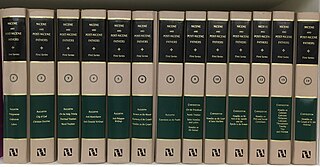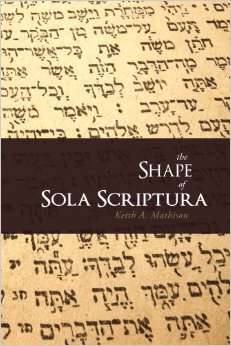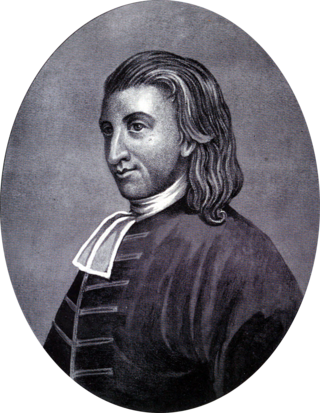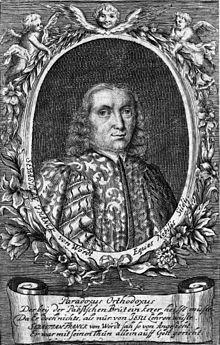Sola scriptura is a Christian theological doctrine held by most Protestant Christian denominations, in particular the Lutheran and Reformed traditions, that posits the Bible as the sole infallible source of authority for Christian faith and practice. The Catholic Church considers it heterodox and generally the Orthodox churches consider it to be contrary to the phronema of the Church.
The five solae of the Protestant Reformation are a foundational set of Christian theological principles held by theologians and clergy to be central to the doctrines of justification and salvation as taught by the Calvinism and Lutheranism branches of Protestantism, as well as in some sects of Pentecostalism. Each sola represents a key belief in these Protestant traditions that is distinct from the theological doctrine of the Catholic Church, although they were not assembled as a theological unit until the 20th century. The Reformers are known to have only clearly stated two of the five solae. Even today there are differences as to what constitutes the solae, how many there are, and how to interpret them to reflect the Reformers' beliefs.
Systematic theology, or systematics, is a discipline of Christian theology that formulates an orderly, rational, and coherent account of the doctrines of the Christian faith. It addresses issues such as what the Bible teaches about certain topics or what is true about God and His universe. It also builds on biblical disciplines, church history, as well as biblical and historical theology. Systematic theology shares its systematic tasks with other disciplines such as constructive theology, dogmatics, ethics, apologetics, and philosophy of religion.
Christian tradition is a collection of traditions consisting of practices or beliefs associated with Christianity. These ecclesiastical traditions have more or less authority based on the nature of the practices or beliefs and on the group in question. Many churches have traditional practices, such as particular patterns of worship or rites, that developed over time. Deviations from such patterns are sometimes considered unacceptable or heretical. There are certain Christian traditions that are practiced throughout the liturgical year, such as praying a daily devotional during Advent, erecting a nativity scene during Christmastide, chalking the door on Epiphany Day, fasting during Lent, waving palms on Palm Sunday, eating easter eggs during Eastertide, and decorating the church in red on Pentecost.
Biblical hermeneutics is the study of the principles of interpretation concerning the books of the Bible. It is part of the broader field of hermeneutics, which involves the study of principles of interpretation, both theory and methodology, for all forms of communication, nonverbal and verbal.
Anthony Charles Thiselton was an English Anglican priest, theologian, and academic. He wrote a number of books and articles on a range of topics in Christian theology, biblical studies, and the philosophy of religion. He served on the Human Fertilisation and Embryology Authority, appointed by the Minister of Health.

Sacred tradition, also called Holy tradition or Apostolic tradition, is a theological term used in Christian theology. According to this theological position, sacred tradition is the foundation of the doctrinal and spiritual authority of Christianity and of the Bible. Thus, the Bible must be interpreted within the context of sacred tradition and within the community of the denomination. The denominations that ascribe to this position are the Catholic, Eastern Orthodox, and Oriental Orthodox churches, and the Assyrian churches.

Trinity Evangelical Divinity School (TEDS) is an academic divinity school founded in 1897 and located in the northern Chicago suburb of Deerfield, Illinois. It is part of and located on the main campus of Trinity International University. It’s among the most conservative and largest theological educational institutions. Since the reorganization of Trinity in 1963 by Kenneth Kantzer, the school has consistently recruited and retained some of the top scholars in the world to serve as faculty.
Prima scriptura is the Christian doctrine that canonized scripture is "first" or "above all" other sources of divine revelation. Implicitly, this view suggests that, besides canonical scripture, there can be other guides for what a believer should believe and how they should live, such as the Holy Spirit, created order, traditions, charismatic gifts, mystical insight, angelic visitations, conscience, common sense, the views of experts, the spirit of the times or something else. Prima scriptura suggests that ways of knowing or understanding God and his will that do not originate from canonized scripture are perhaps helpful in interpreting that scripture, but testable by the canon and correctable by it, if they seem to contradict the scriptures. Prima sciptura is upheld by the Anglican, Methodist and Pentecostal traditions of Christianity, which suggest that Scripture is the primary source for Christian doctrine, but that "tradition, experience, and reason" can nurture the Christian religion as long as they are in harmony with the Bible.
The historical-grammatical method is a modern Christian hermeneutical method that strives to discover the biblical authors' original intended meaning in the text. According to the historical-grammatical method, if based on an analysis of the grammatical style of a passage, it appears that the author intended to convey an account of events that actually happened, then the text should be taken as representing history; passages should only be interpreted symbolically, poetically, or allegorically if to the best of our understanding, that is what the writer intended to convey to the original audience. It is the primary method of interpretation for many conservative Protestant exegetes who reject the historical-critical method to various degrees, in contrast to the overwhelming reliance on historical-critical interpretation in biblical studies at the academic level.
Kevin Jon Vanhoozer is an American theologian and current research professor of Systematic Theology at Trinity Evangelical Divinity School (TEDS) in Deerfield, Illinois. Much of Vanhoozer's work focuses on systematic theology, hermeneutics, and postmodernism.
Bibliolatry is the worship of a book, idolatrous homage to a book, or the deifying of a book. It is a form of idolatry. The sacred texts of some religions disallow icon worship, but over time the texts themselves are treated as sacred the way idols are, and believers may end up effectively worshipping the book. Bibliolatry extends claims of inerrancy—hence perfection—to the texts, precluding theological innovation, evolving development, or progress. Bibliolatry can lead to revivalism, disallows re-probation, and can lead to persecution of unpopular doctrines.

An ordinance is a term used by certain Christian denominations for a religious ritual that was instituted by Jesus for Christians to observe.

In Christianity, the term biblical authority refers to two complementary ideas:
Craig Alan Blaising is the former Executive Vice President and Provost of Southwestern Baptist Theological Seminary. Blaising earned a Doctor of Theology from Dallas Theological Seminary and a Doctor of Philosophy degree at the University of Aberdeen, Scotland, a Master of Theology Dallas Theological Seminary, and a Bachelor of Science in Aerospace Engineering from the University of Texas at Austin. He is a recognized authority in patristic studies and eschatology and is one of the primary proponents of "progressive dispensationalism."

The Shape of Sola Scriptura is a 2001 book by Reformed Christian theologian Keith Mathison. Mathison traces the development of sola scriptura from the early church to the present. He views the Protestant Reformation as a time of recovery of the doctrine that had been under assault from the fourth century. He argues that relativism and individualism permeate present-day teaching on the subject, and that widespread misunderstanding of the doctrine of sola scriptura has been eroding the church from within. This, in Mathison's view, has led to conversions from Protestantism to other religions, and has undermined the relationship among Scripture, church tradition, and individual believers as set forth by the early church and restated by the Magisterial Reformers.
Nigel Goring Wright is a British Baptist theologian.

Criticism of Protestantism covers critiques and questions raised about Protestantism, the Christian denominations which arose out of the Protestant Reformation. While critics may praise some aspects of Protestantism which are not unique to the various forms of Protestantism, Protestantism is faced with criticism mainly from the Catholic Church and the Eastern Orthodox Church, although Protestant denominations have also engaged in self-critique and criticized one another. According to both the Catholic Church and Eastern Orthodoxy, many major, foundational Protestant doctrines have been officially declared heretical.

Keith A. Mathison is an American Reformed theologian.

Republication is form of Christian covenant theology where the works principle of the covenant of works was republished in some way in the Mosaic covenant. The view is popular among academics of the Westminster Seminary California and was popularized by American theologian Meredith Kline. Kline taught that the Mosaic covenant included a typological republication of the covenant of works, where the Israelites had to maintain possession of the promised land by their "typological merit". Republication is similar to the Lutheran views of the Mosaic covenant.








